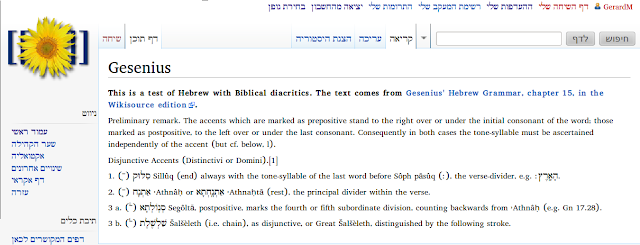One problem though; they complain that they have to install fonts manually to be able to read it properly. Santhosh and his WebFonts extension sounded just like what the doctor ordered.
He got into contact with Santhosh and the result is an article with perfectly displayed Hebrew in an English text due to some template magic by Amir. The template {{lang-he|סִלּוּק}} does not only define where the Hebrew text starts and stops, it ensures that the web fonts find their target.
me: Can we do an "interview" so that I can write why YOU want web fonts and input methods for Hebrew ?
Amir: Of course. In fact, for Hebrew it is much more important than an input method. We'll probably do something with Narayam, too, but WebFonts are really, really important.
me: why ?
Amir: Because of the diacritics. Most common fonts in most operating systems don't display diacritics correctly. They are not needed for most day-to-day texts, but they are very important for reference books, poetry and religious books. Wikipedia is a reference book; Wikisource is a collection of published literature and the Hebrew Wikisource would like to have more poetry and it looks ugly to people who didn't install a proper font; And religious books are important not just to religious Jews, but to many, many people who study the Bible for religious and scientific reasons all around the world.
me: would you prefer WebFonts to be on by default ?
Amir: I have to try the extension first, and we'll have to discuss it in Wikisource and Wikipedia, but it's possible that we shall want it on by default.
me: Do you have an URL for freely licensed fonts ?
 |
| Both academic grammar books and nursery rhymes need good fonts |
And here's another one, with a collection of more modern fonts.
me: So you would like to have different fonts for different projects ?
Amir: These would be good for regular Wikipedia articles and modern poetry. And also children's books and textbooks. It would be useful to have two or three fonts for different styles of books.
me: Would they do a good job for religious text as well making it a matter of personal preference?
Amir: The modern fonts would be enough for religious texts, too. They wouldn't we very beautiful, but not too ugly either. It's like printing an English Bible in Arial :)
me: .. and many of the fonts people have on their system are inadequate ..
Amir: Yes, some fonts that ship with Windows 7 are technically OK, but it's not very common yet, and these fonts are not freely licensed. Windows XP is inadequate, but if you install these fonts it can be fine. The same goes for Apple systems.
me: Thanks, Amir. It will be nice to have WebFonts live at Wikimania time.
Thanks,
GerardM


No comments:
Post a Comment